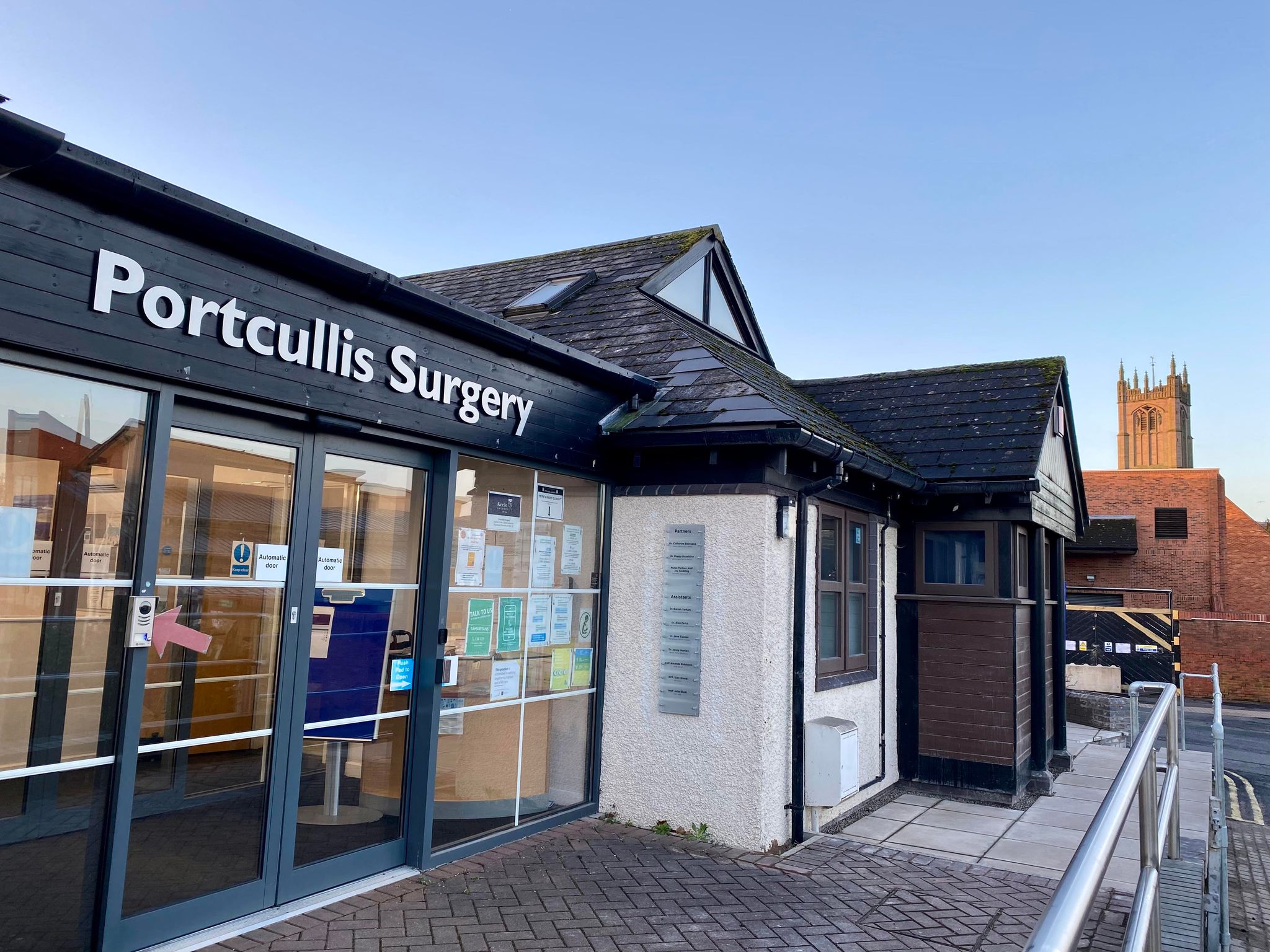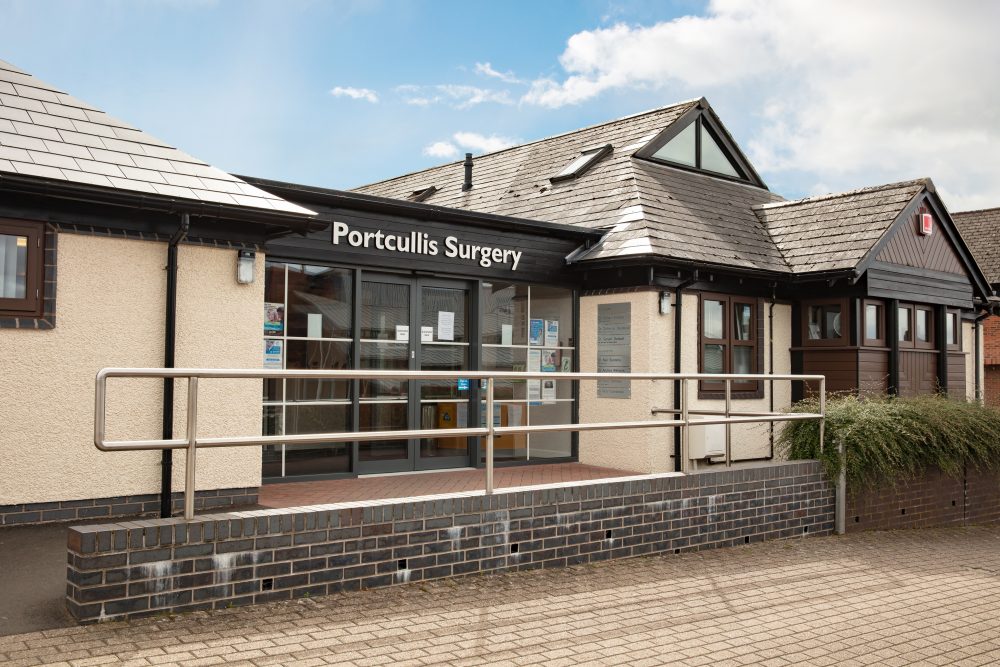Portcullis Surgery
Portcullis Lane, Ludlow, SY8 1GT Send us an online question or request
Telephone: 01584 872 939
We are closed. Call 111 for urgent advice out of hours.

Update on Computer systems Good News! 21/7/2024. Update on Computer systems 20/7/2024. Computer failure 19/7/2024 GPs Are On Your Side Happy Retirement to Sue, Nicky and Alex from Alexandra House Residential Care Home New First Contact Physiotherapist Relaxation Event at the Ludlow Piano Festival 2024 TRAVEL VACCINES: Do you need vaccinations for travel? New entrance to the practice THE NHS APP AND ACCESS TO YOUR ONLINE RECORDS
HIGH RISK GROUPS ELIGIBLE FOR ANTIVIRAL MEDICATION
WHAT DO I DO IF I THINK I HAVE COVID AND I AM ELIGIBLE FOR ANTIVIRAL MEDICATION?
0333 577 0779 Herefordshire CCG
The following groups of patients are entitled to an Antiviral medication if they become Covid positive.
Down’s syndrome and other genetic disorders
All individuals with Down’s syndrome or other chromosomal disorders known to affect immune competence (decision to treat to be at the discretion of the treating clinician).
Solid cancer
- metastatic or locally advanced inoperable cancer
- lung cancer (at any stage)
- people receiving any chemotherapy (including antibody-drug conjugates), PI3K inhibitors or radiotherapy[footnote 6] within 12 months
- people who have had cancer resected within 3 months[footnote 7] and who received no adjuvant chemotherapy or radiotherapy
- people who have had cancer resected within 3 to 12 months and receiving no adjuvant chemotherapy or radiotherapy are expected to be at less risk (and thus less priority) but still at increased risk compared with the non-cancer populations
Haematological diseases and recipients of haematological stem cell transplant (HSCT)
- allogeneic HSCT recipients in the last 12 months or active graft versus host disease (GVHD) regardless of time from transplant (including HSCT for non-malignant diseases)
- autologous HSCT recipients in the last 12 months (including HSCT for non-malignant diseases)
- individuals with haematological malignancies who have received CAR-T cell therapy in the last 24 months, or radiotherapy in the last 12 months
- individuals with haematological malignancies receiving systemic anti-cancer treatment (SACT) within the last 12 months
- all people who do not fit the criteria above, and are diagnosed with:
- myeloma (excluding monoclonal gammopathy of undetermined significance (MGUS))
- AL amyloidosis
- chronic B-cell lymphoproliferative disorders (chronic lymphocytic leukaemia, follicular lymphoma)
- myelodysplastic syndrome (MDS)
- chronic myelomonocytic leukaemia (CMML)
- myelofibrosis
- all people with sickle cell disease
- people with thalassaemia or rare inherited anaemia with any of the following (the decision to treat these patients will need to be at the individual patient level with input from the haematology consultant responsible for the management of the patient’s haematological condition):
- severe cardiac iron overload (T2 * less than 10ms on magnetic resonance imaging)
- severe to moderate iron overload (T2 * greater than or equal to 10ms on magnetic resonance imaging) plus an additional co-morbidity of concern (for example, diabetes, chronic liver disease or severe hepatic iron load on MRI)
- individuals with non-malignant haematological disorders (for example, aplastic anaemia or paroxysmal nocturnal haemoglobinuria) receiving B-cell depleting systemic treatment (for example, anti-CD20, anti-thymocyte globulin (ATG) and alemtuzumab) within the last 12 months
Renal disease
- renal transplant recipients (including those with failed transplants within the past 12 months), particularly those who have:
- received B cell depleting therapy within the past 12 months (including alemtuzumab, rituximab (anti-CD20), anti-thymocyte globulin)
- an additional substantial risk factor which would in isolation make them eligible for monoclonals or oral antivirals
- not been vaccinated prior to transplantation
- non-transplant renal patients who have received a comparable level of immunosuppression. Please refer to the section on ‘Immune-mediated inflammatory diseases’ below for a list of qualifying immunosuppressive therapies
- patients with chronic kidney disease (CKD) stage 4 or 5 (an eGFR less than 30ml per min per 1.73m2) without immunosuppression
Liver diseases
- people with cirrhosis Child-Pugh class A,B and C, whether receiving immune suppressive therapy or not. Those with decompensated liver disease (Child-Pugh B and C) are at greatest risk
- people with a liver transplant
- people with liver disease on immune suppressive therapy (including people with and without cirrhosis) – please refer to the section on ‘Immune-mediated inflammatory diseases’ below for a list of qualifying immunosuppressive therapies
Solid organ transplant recipients
Solid organ transplant recipients not in any of the above categories.
Immune-mediated inflammatory disorders
- people who have received a B-cell depleting therapy (anti-CD20 drug for example rituximab, ocrelizumab, ofatumab, obinutuzumab) in the last 12 months
- people who have been treated with cyclophosphamide (IV or oral) in the 6 months prior
- people who are on biologics[footnote 8] or small molecule JAK-inhibitors (except anti-CD20 depleting monoclonal antibodies) or who have received these therapies within the last 6 months
- people who are on current treatment with mycophenolate mofetil, oral tacrolimus, azathioprine/mercaptopurine (for major organ involvement such as kidney, liver and/or interstitial lung disease), methotrexate (for interstitial lung disease) and/or ciclosporin
- people who are on corticosteroids (equivalent to greater than 10mg per day of prednisolone) for at least the 28 days prior
- Long-term moderate dose corticosteroids (equivalent to ≥10mg prednisolone per day for more than 4 weeks) in the previous 3 months.
- Certain combination therapies at individual doses lower than above, including those on ≥7.5mg prednisolone per day in combination with other immunosuppressants (other than hydroxychloroquine or sulfasalazine) and those receiving methotrexate (any dose) with leflunomide in the previous 3 months.
- Individuals who had received high-dose steroids (equivalent to >40mg prednisolone per day for more than a week) for any reason in the month before vaccination.
- people who exhibit at least one of: (a) uncontrolled or clinically active disease (that is required recent increase in dose or initiation of new immunosuppressive drug or IM steroid injection or course of oral steroids within the 3 months prior; and/or (b) major organ involvement such as significant kidney, liver or lung inflammation or significantly impaired renal, liver and/or lung function)
Immune deficiencies
- common variable immunodeficiency (CVID)
- undefined primary antibody deficiency on immunoglobulin (or eligible for Ig)
- hyper-IgM syndromes
- Good’s syndrome (thymoma plus B-cell deficiency)
- severe combined immunodeficiency (SCID)
- autoimmune polyglandular syndromes or autoimmune polyendocrinopathy, candidiasis, ectodermal dystrophy (APECED syndrome)
- primary immunodeficiency associated with impaired type 1 interferon signalling
- x-linked agammaglobulinaemia (and other primary agammaglobulinaemias)
- any person with secondary immunodeficiency receiving, or eligible for, immunoglobulin replacement therapy
HIV/AIDS
- people with high levels of immune suppression, have uncontrolled or untreated HIV (high viral load) or present acutely with an AIDS defining diagnosis
- people on treatment for HIV with CD4 less than 350 cells per mm3 and stable on HIV treatment or CD4 greater than 350 cells per mm3 and additional risk factors (for example, age, diabetes, obesity, cardiovascular, liver or renal disease, homeless, alcoholic dependency)[footnote 9]
Rare neurological and severe complex life-limiting neurodisability conditions
An NHS England and Improvement (NHSEI) expert group has identified the key conditions are:
- multiple sclerosis[footnote 10]
- motor neurone disease
- myasthenia gravis
- Huntington’s disease
Children and young people at substantial risk
Complex life-limiting neurodisability with recurrent respiratory infections or compromise.
Children and young people at significant risk if 2 or more of these risk factors are present
Primary immunodeficiency:
- common variable immunodeficiency (CVID)
- primary antibody deficiency on immunoglobulin (or eligible for immunoglobulin replacement)
- hyper-IgM syndromes
- Good’s syndrome (thymoma plus B-cell deficiency)
- severe combined immunodeficiency (SCID)
- autoimmune polyglandular syndromes or autoimmune polyendocrinopathy, candidiasis, ectodermal dystrophy (APECED syndrome)
- primary immunodeficiency associated with impaired type I interferon signalling
- x-linked agammaglobulinaemia (and other primary agammaglobulinaemias)
Secondary immunodeficiency:
- HIV CD4 count less than 200 cells per mm3
- solid organ transplant
- HSCT within 12 months, or with GVHD
- CAR-T therapy in last 24 months
- induction chemotherapy for acute lymphoblastic leukaemia (ALL), non-Hodgkin’s lymphoma, chemotherapy for acute myeloid leukaemia (AML), relapsed and/or refractory leukaemia or lymphoma
Immunosuppressive treatment:
- chemotherapy within the last 3 months
- cyclophosphamide within the last 3 months
- corticosteroids greater than 2mg per kg per day for 28 days in last 4 weeks
- B cell depleting treatment in the last 12 months
Other conditions:
- high BMI (greater than 95th centile)
- severe respiratory disease (for example, cystic fibrosis or bronchiectasis with FEV1 less than 60%)
- tracheostomy or long-term ventilation
- severe asthma (paediatric intensive care unit (PICU) admission in 12 months)
- neurodisability and/or neurodevelopmental disorders
- severe cardiac disease
- severe chronic kidney disease
- severe liver disease
- sickle cell disease or other severe haemoglobinopathy
- trisomy 21
- complex or chromosomal genetic or metabolic conditions associated with significant comorbidity
- multiple congenital anomalies associated with significant comorbidity
Opening Times
- Monday
08:30am to 06:00pm
6.30-9.30pm Bookable in advance appointments only.Call 111 for advice OOH - Tuesday
08:30am to 06:00pm
6.30-8pm Bookable in advance appointments only. Call 111 for advice OOH - Wednesday
08:30am to 06:00pm
6.30-9.30pm Bookable in advance appointments only.Call 111 for advice OOH - Thursday
08:30am to 06:00pm
6.30-8pm Bookable in advance appointments only.Call 111 for advice OOH - Friday
08:30am to 06:00pm
6.30-9.30pm One Friday a month Bookable in advance appointments only.Call 111 for advice OOH - Saturday
CLOSED
9-5pm One Saturday a month Bookable in advance appointments only.Call 111 for advice OOH - Sunday
CLOSED
Call 111 for advice OOH






